Photo: Kevin Mazur/WireImage.com
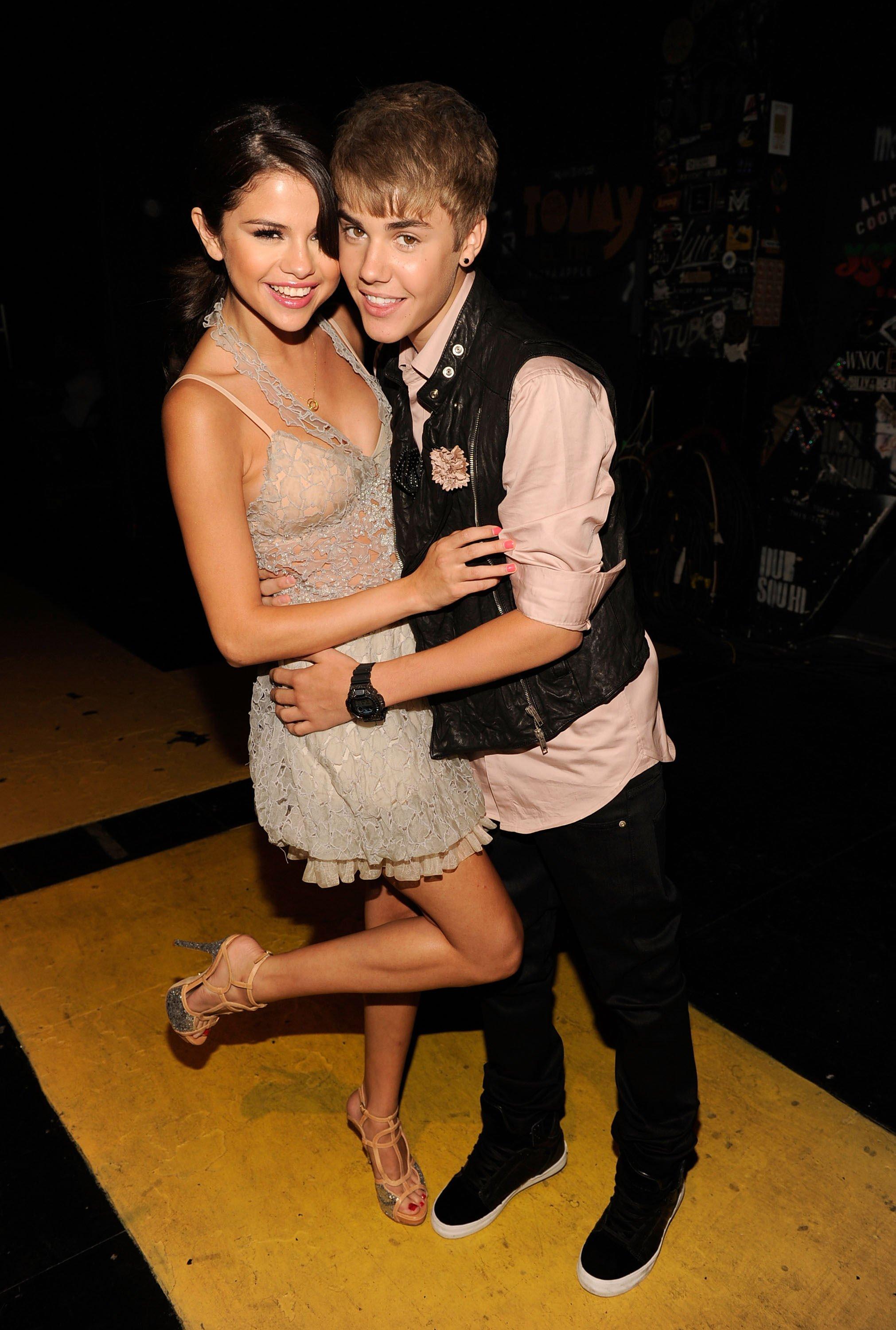
news
FYI/TMI: Justin Bieber Wins At EMAs, Loses Selena Gomez
Bieber, Taylor Swift win big at MTV EMAs, bad breakups for Bieber, Gomez and INXS
(In an effort to keep you fully informed, and fully entertained, below we present today's FYI and TMI — news you need and news that's, well, sometimes needless….)
FYI …
Bieber, Swift Win Big At MTV EMAs
Justin Bieber and Taylor Swift were the top winners at the 2012 MTV European Music Awards on Nov. 11 in Frankfurt, Germany, garnering honors for Best Female and Best Male, respectively, among other awards. GRAMMY winner Whitney Houston was honored with the Global Icon Award. Additional winners included Lana Del Rey, Carly Rae Jepsen, Linkin Park, Nicki Minaj, and One Direction, among others.
TMI …
Gomez, Bieber Break Up, INXS Split
Teenage power couple Justin Bieber and Selena Gomez have called it quits after a nearly two-year relationship due to their "crazy schedules," according to a source reported by Us magazine. "Selena definitely had some major trust issues with Justin," the source continued. Gomez must not have been convinced when Bieber sang, "If I was your boyfriend, I'd never let you go." With Bieber back on the market, teenage girls everywhere are learning to beliebe again. In related breakup news, after 35 years of music, Australian pop/rock collective INXS no longer need each other tonight — or any other night. During a concert opening for Matchbox 20 on Nov. 11 in Perth, Australia, drummer Jon Farriss said the performance would be the GRAMMY-nominated band's last. "I'm getting teary," Farris noted before the band played their final song, "I Need You Tonight," according to a report.
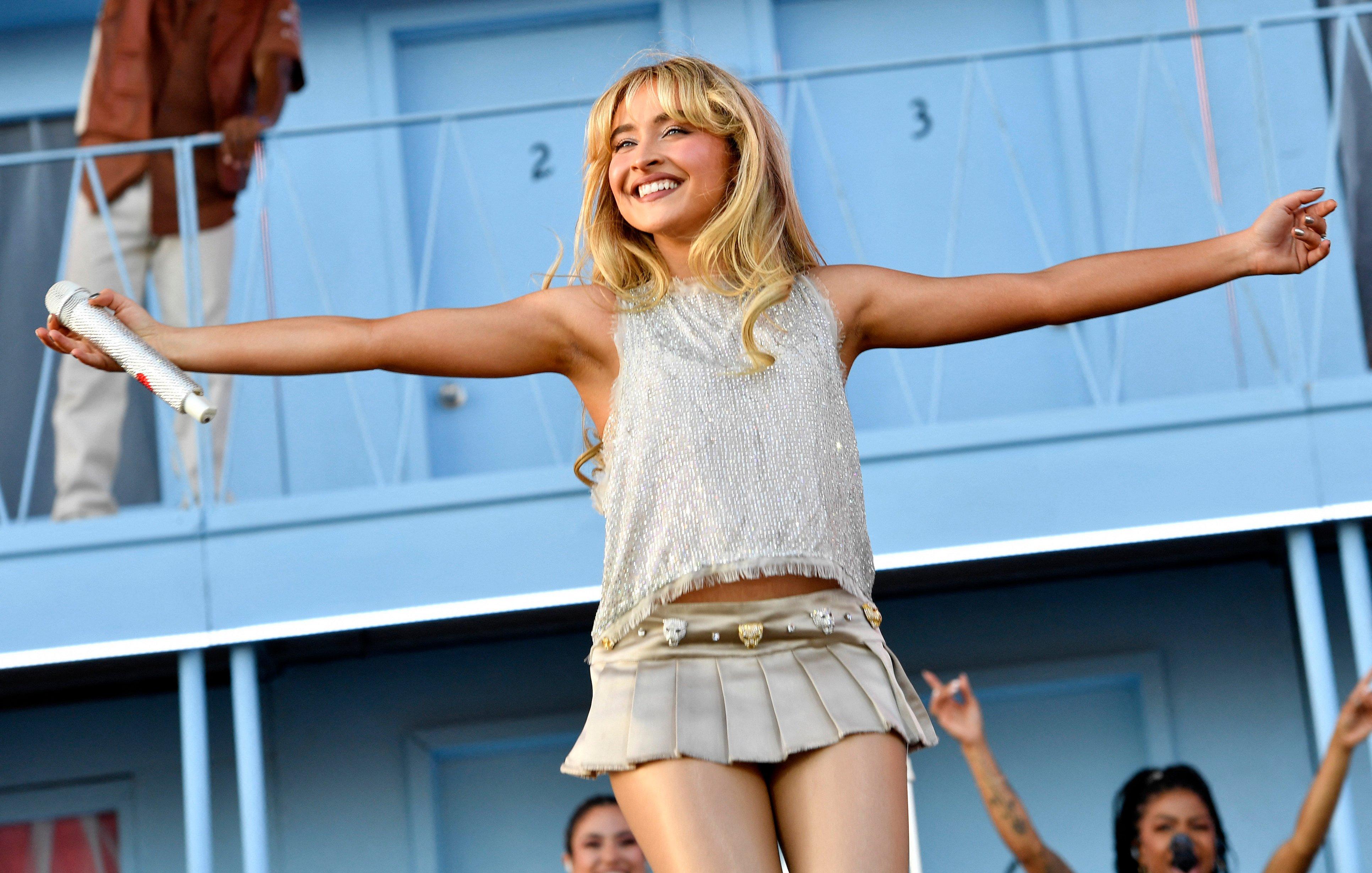
Photo: ALERIE MACON / AFP via Getty Images
feature
How Sabrina Carpenter Became A Pop Queen: Tracing Her Journey To 'Short N' Sweet'
More than a decade in the making, Sabrina Carpenter is living out her superstar dreams. As she releases her new album, 'Short n' Sweet,' look back on the chart-topping star's journey and how every venture helped her evolve into a pop phenom.
Sabrina Carpenter is the first to admit that it's taken her a bit of time to find her way to the top of the music industry. She even likens herself to the tortoise in the fable "The Tortoise and the Hare" — even if she didn't want to believe the metaphor growing up.
"Something that my mom always said to me as a little girl that really annoyed me was that I am the tortoise… throughout my life, [I was] being told, 'Sabrina, you're the tortoise, just chill,'" Carpenter recalled while accepting the Variety Hitmakers Rising Artist Award in December 2023. "In moments of frustration and confusion it can feel like a letdown, but it turns out it's actually a very good thing."
It's been a very good thing for Carpenter, indeed. A decade since the release of her debut single, the singer/songwriter isn't just breaking through — she's one of pop's new reigning queens. Over the last year, Carpenter has nabbed her first No. 1 song on the Billboard Hot 100, made a stellar debut at Coachella, and performed on "Saturday Night Live," all the while racking up billions of streams on her music new and old. It's all built excitement for one of the most anticipated pop albums of the summer: Short n' Sweet.
As Carpenter unveils her new album, take a deep dive into her decade-long journey to pop stardom.
Getting Started: Disney Breakthrough
Growing up, Carpenter filled the sounds of her family home in Pennsylvania with covers of songs like Adele's "Set Fire To The Rain" and "Picture to Burn" by future Eras Tour companion Taylor Swift (more on that later). After submitting videos for a singing contest spearheaded by Miley Cyrus, Carpenter would get her first taste of success. Placing third, she caught the eye of Hollywood Records, who signed her following the competition.
Simultaneously, Carpenter also began pursuing acting, landing guest spots on series like "Law & Order: Special Victims Unit" in 2011 and joining "The Goodwin Games" in 2012. In 2014, she landed a lead role in the Disney Channel series "Girl Meets World," a spin-off of the beloved '90s series "Boy Meets World," which served as a breakthrough moment for the burgeoning star — and a catalyst for her music career.
Just before the show debuted, Carpenter released her debut single, "Can't Blame A Girl for Trying," the title track to her debut EP that arrived a month later. While the four-track EP was the typical output of a teenage Disney star — bubblegum pop sounds with digestible, family-friendly lyricism — it showed off her youthful timbre and offered themes that would become prevalent later in Carpenter's songwriting: love, heartache, and navigating life.
A year later, she released her debut album, Eyes Wide Open. A mix of pop with folk and country influences — a soundscape that remains on Short n' Sweet — Carpenter's debut showed maturity and growth following Can't Blame A Girl For Trying; songs like "Eyes Wide Open" and "We'll Be the Stars" showed a more introspective side, reflecting on the pressures of being in the spotlight and the journey of finding her identity. Eyes Wide Open also hinted that Carpenter was beginning to hone her songwriting skills, penning four of the 12 tracks.
It would be on her 2016 sophomore album, EVOLution, where Carpenter would find confidence as a songwriter, co-writing all but one song on the 10-track project. In turn, the lyrics reflected her growing sense of self and a new perspective on past themes, like embracing non-romantic forms of love in "All We Have is Love," being there for a struggling friend in "Shadows," and learning to assert boundaries in "Space."
EVOLution transitioned Carpenter out of the teen pop aesthetic into a more sophisticated sound, experimenting with dance-pop and techno sonics. Genre versatility would become a throughline of sorts for Carpenter, and EVOLution foreshadowed the multifaceted musicality that was to come.
Shedding Disney: From Child Actor To Pop Star
After "Girl Meets World" came to an end at the beginning of 2017, Carpenter was ready for reinvention. Much like Britney Spears' Britney and Cyrus' Can't Be Tamed before her, as Carpenter grew into an adult, she felt like she needed to shed the Disney-fied image that has become a rite of passage for teen stars. Thus began the Singular era.
Released in 2018 and 2019, respectively, Singular: Act I and Singular: Act II featured songs that were more risqué and mature in nature. A far cry from her tamer work of the past, the R&B track "Hold Tight" is equal parts sultry and evocative with Carpenter singing, "Wanna keep you in, wanna keep you in right/ Wanna feel your skin, wanna feel it on mine."
As she noted in an interview with Billboard, Singular: Act I was a natural progression for a girl now in her late teens — even if it was against the squeaky-clean image of her beginnings.
"I was known as a fictional character on television with lines that were written for her with an attitude that was portrayed in a way by other people. So for a lot of people, their first impression of me was as a 13-year-old girl [singing] the kinds of songs that she should be singing," she said. "Then, flash forward to 19, and people are asking why I am not singing about the same things that I did when I was 13, as if that's normal."
One of the more notable Singular tracks is from Act I, "Sue Me." Sneakily disguised as a story about a romantic relationship, the song is Carpenter's response to being sued by her ex music managers: "That's my shape, I made the shadow/ That's my name, don't wear it out though/ Feelin' myself can't be illegal." Its tongue-in-cheek and snarky nature would inevitably embolden Carpenter to continue writing more confessional songs with attitude, whether she's responding to media scrutiny in "because i liked a boy" from 2022's emails i can't send, or warning a suitor to be careful in Short n' Sweet's "Please, Please, Please."
Singular: Act I and Act II further helped demonstrate different facets of Carpenter's musicality, with the former leaning into pop tendencies and the latter embracing an R&B flair. And as her final albums with Hollywood Records, she used Singular: Act I and Act II to indicate that she wasn't going to let any sort of previous perceptions hold her back. Their coming-of-age themes showcased Carpenter as an artist coming into her own — regardless of whether listeners wanted to keep her in the Disney box or not.
Reintroducing Herself: Artistic Authenticity & The "Nonsense" Effect
While the world was going through a period of change amid the COVID-19 pandemic, so was Carpenter. She signed with Universal Music Group's Island Records in 2021, and soon she would be able to fully introduce the world to who Sabrina Carpenter is as an artist.
As she noted herself to Variety earlier this year, her 2022 LP, emails i can't send, "marked the beginning of a really freeing and artistic time for me." Once again, she co-wrote every song on the album; this time, though, she only had one co-writer for each track, and even wrote two songs solo ("emails i can't send" and "how many things") — proving that she was more assured as a songwriter than ever.
As a result, Carpenter's knack for confessional songwriting is on full display. emails i can't send represents a reflective time capsule of sorts; one that brings the curiosity of her earlier work with the perspective and wisdom of a young adult. Her growing fame meant there was more attention on her personal life, and emails i can't send allowed her to reclaim her narrative and express her side of the story.
Carpenter's candidness struck a chord with listeners, and upon the release of emails i can't send in July 2022, it was clear Carpenter was on a new trajectory. The album debuted at No. 23 on the Billboard 200, which marked her highest entry on the chart to date (as of press time); the 2022 stretch of her Emails I Can't Send Tour sold out in less than a day. And once "Nonsense" was released as a single that November, her place as a rapidly rising star was solidified.
"Nonsense" was initially written as a means to an end after Carpenter was writing a sad song and had writer's block. Now, the track is the epitome of Carpenter's lyricism, weaving together her wit and humor with an infectious hook. First gaining traction on TikTok because of its catchiness, it's become a beloved part of Carpenter's canon thanks to her inventive and bespoke outros during her live shows. It's since become a tradition for fans to check to see what outro she created for each performance, adding to the fan fervor.
Carpenter further satiated fans' taste for her cheeky lyricism in March 2023, when she released emails i can't send fwd:, the deluxe version of her album, which featured a new track called "Feather." She took the playful, flirting energy of "Nonsense" and infused "Feather" with buoyant, airy production that mimics the feeling of self-liberation after moving on from a relationship. Earning Carpenter her first pop radio No. 1, "Feather" proved that the singer's audacious style was taking hold — and it set the stage for an even bigger 2024.
Becoming A Superstar: Eras Tour, "Espresso" & Beyond
After her own extensive — and very sold out — tour in support of Emails I Can't Send, Carpenter's rising star status was further confirmed by pop's current queen, Taylor Swift. The singer earned a coveted opening slot on Swift's monumental Eras Tour in Mexico, South America, Australia, and Asia.
Just after her last Eras Tour show in March 2024, Carpenter hinted that her own new era was beginning. "I'm starting to feel like I've outgrown the songs I'm singing," she admitted to Cosmopolitan, "which is always an exciting feeling because I think that means the next chapter is right around the corner."
That chapter began with "Espresso," which dropped a day before her debut Coachella performance. Doubling down on the playful, self-assured vibe of "Nonsense," the song immediately hinted that big things were coming for Carpenter, debuting at No. 7 on the Billboard Hot 100, where it peaked at No. 3.
Upon announcing her sixth album, Short n' Sweet, Carpenter released "Please Please Please." Combining her now-signature playful, carefree lyricism with an airy, disco-tinged sound, "Please Please Please" didn't just present Carpenter as a confident superstar — it became her first Hot 100-topping smash.
Carpenter has referred to Short n' Sweet as the "hot older sister" of emails i can't send. "It's my second 'big girl' album; it's a companion but it's not the same," she explained to Variety, to whom she also admitted she feels a "sense of separation" from her work prior to emails. "When it comes to having full creative control and being a full-fledged adult, I would consider this a sophomore album."
It's apt, then, that her Short n' Sweet collaborators — including songwriters Julia Michaels, Amy Allen and Steph Jones — are largely the same as the team from emails i can't send. "I've really honed in on the people that I love making music with," she told Rolling Stone in June.
Even more telling of the direction she's heading is her work with one of pop's hottest producers — and Swift's right-hand man — Jack Antonoff, for the first time. At a GRAMMY Museum event with Antonoff himself, Carpenter debuted the country-infused "Slim Pickins," presenting yet another pop style from Short n' Sweet. And as "Slim Pickins," "Espresso" and "Please Please Please" indicate, Carpenter's knack for infectious and edgy lyrics isn't just the throughline across Short n' Sweet — it's become the epitome of both her artistry and her stardom.
Just like her metaphorical friend the tortoise, Carpenter's long but steady journey has clearly paid off. As she's figured out who she is on her own terms, she's manifested the bonafide superstardom she's always imagined.
"I never had the plan B, and it wasn't even a thought in my mind that it wouldn't work out," she told Rolling Stone. "I just always knew it was about not if it would happen but when it would happen."
For Carpenter, every chapter of her artistry has built on the last; she's refused to rest on her laurels and continuously pursued new directions. She's creating work that wholeheartedly reflects her, and growing a loyal fan base because of it. Her next album might be named Short n' Sweet, but her time as a pop superstar will be anything but.
All Things Sabrina Carpenter
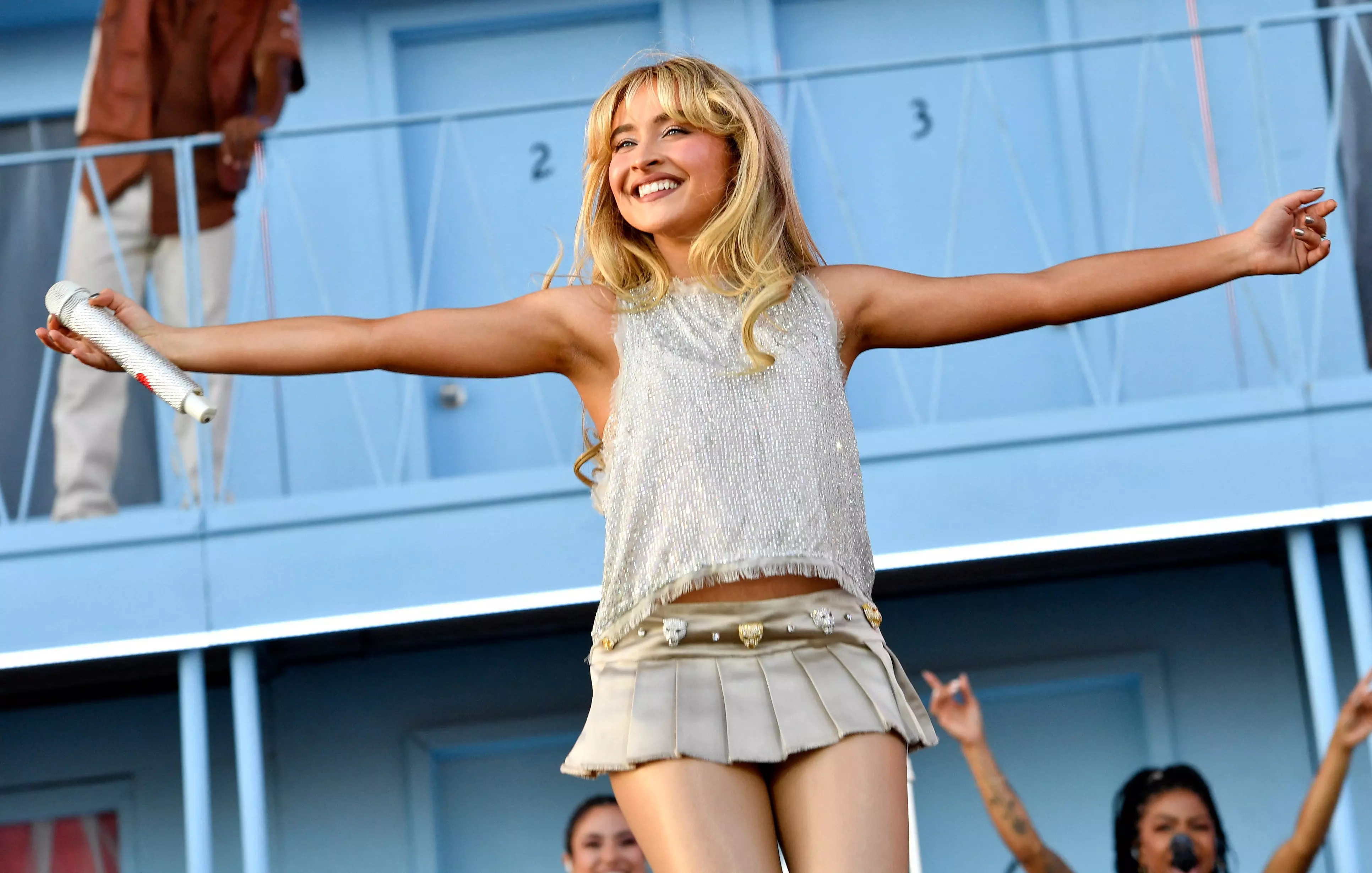
How Sabrina Carpenter Became A Pop Queen: Tracing Her Journey To 'Short N' Sweet'
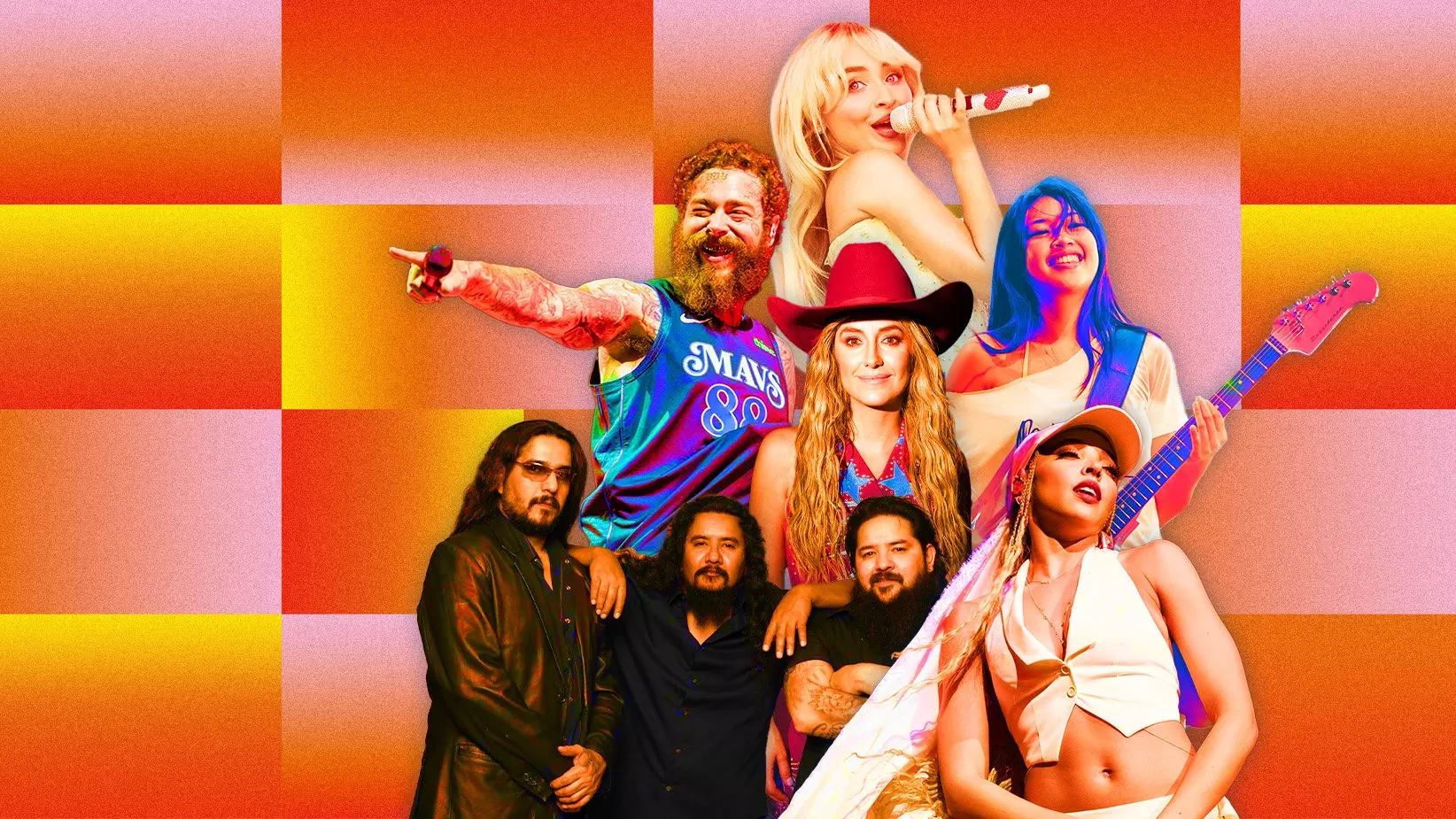
13 Must-Hear Albums In August 2024: Sabrina Carpenter, Post Malone, A$AP Rocky & More
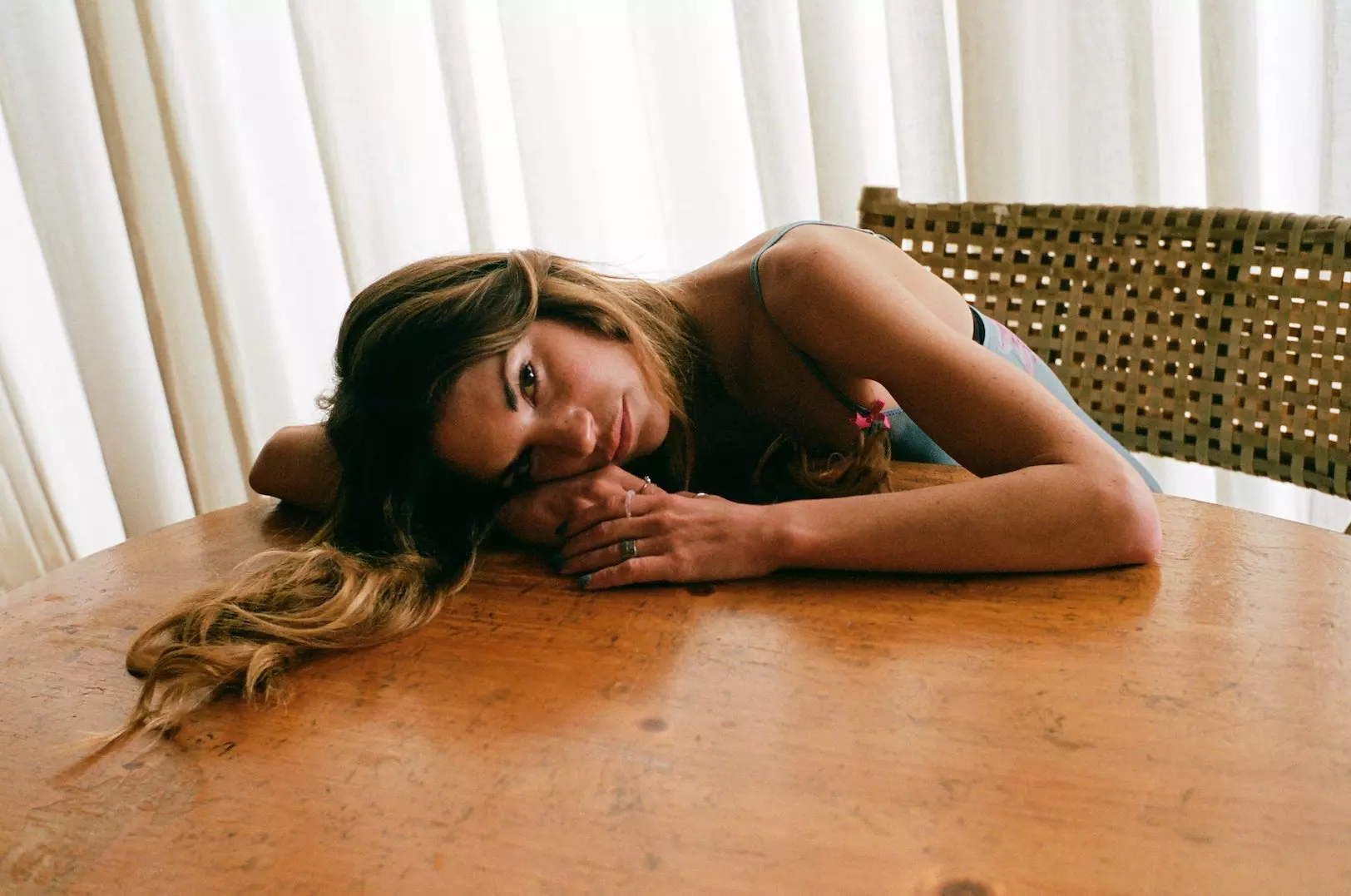
Meet Amy Allen, The Hitmaking Singer/Songwriter Behind Sabrina Carpenter's "Please Please Please" & More Pop Gems
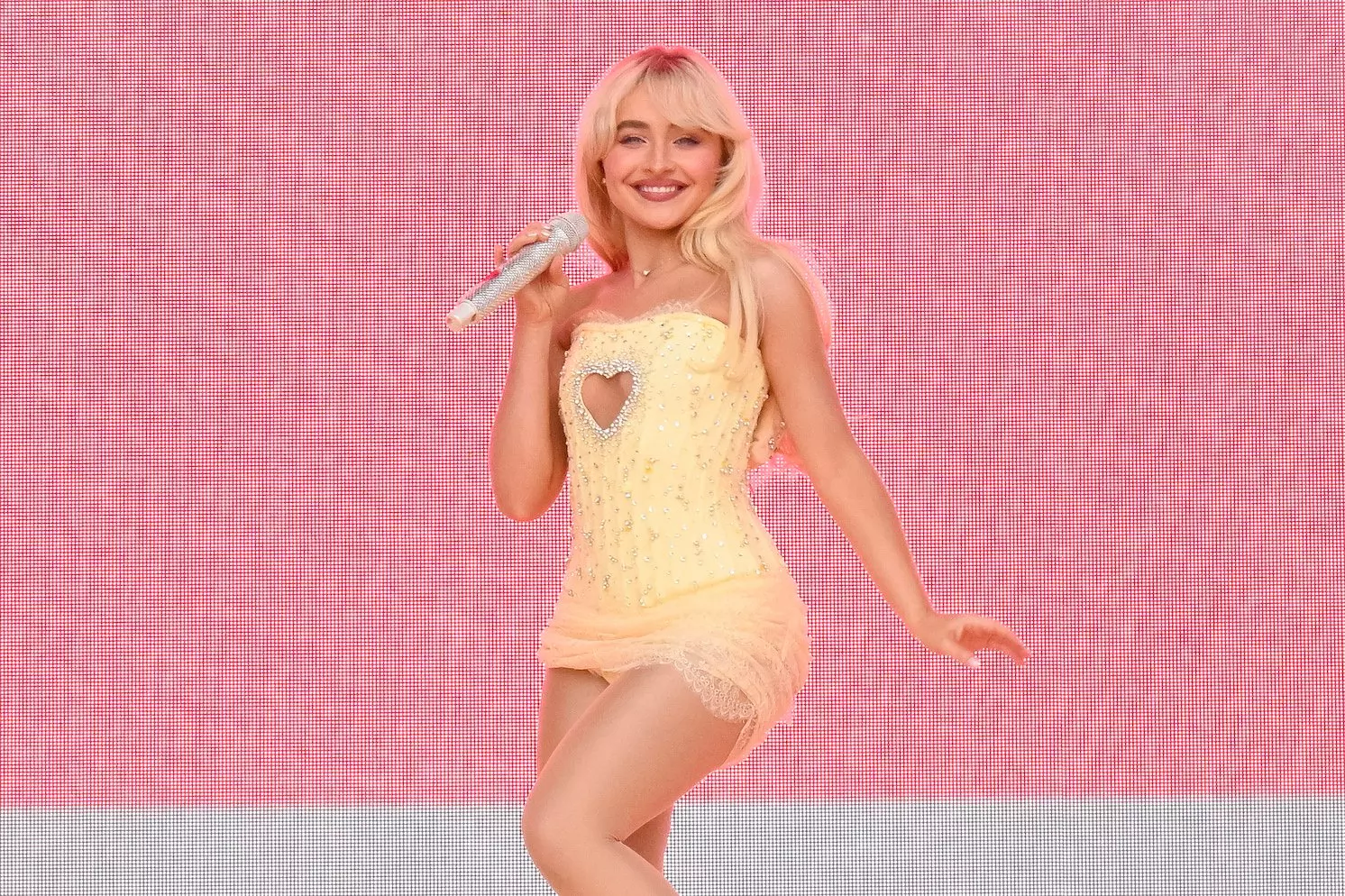
9 New Pride Anthems For 2024: Sabrina Carpenter's "Espresso," Chappell Roan's "Casual" & More
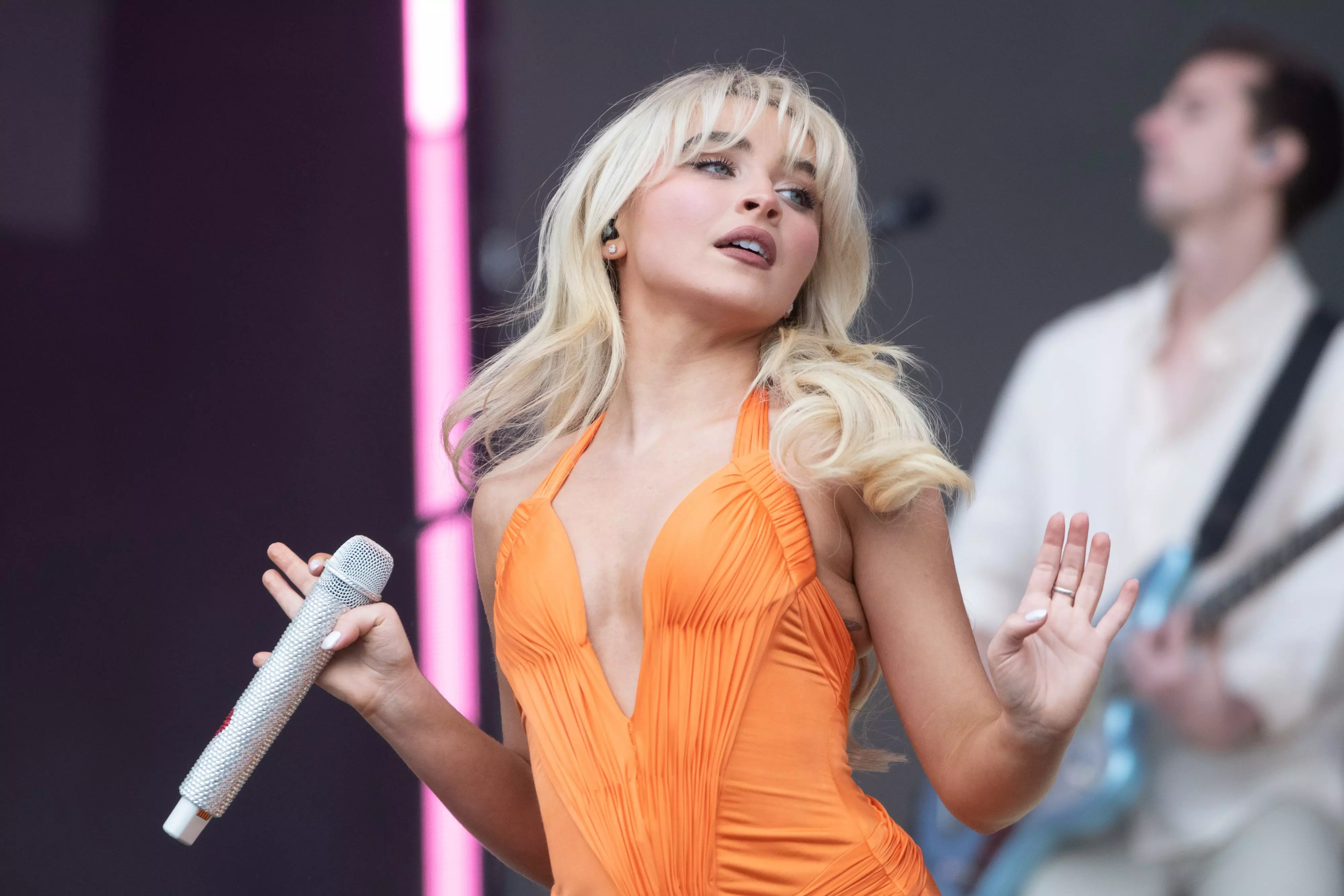
Sabrina Carpenter Releases New Single "Please Please Please": Everything We Know About Her New Album 'Short N' Sweet'
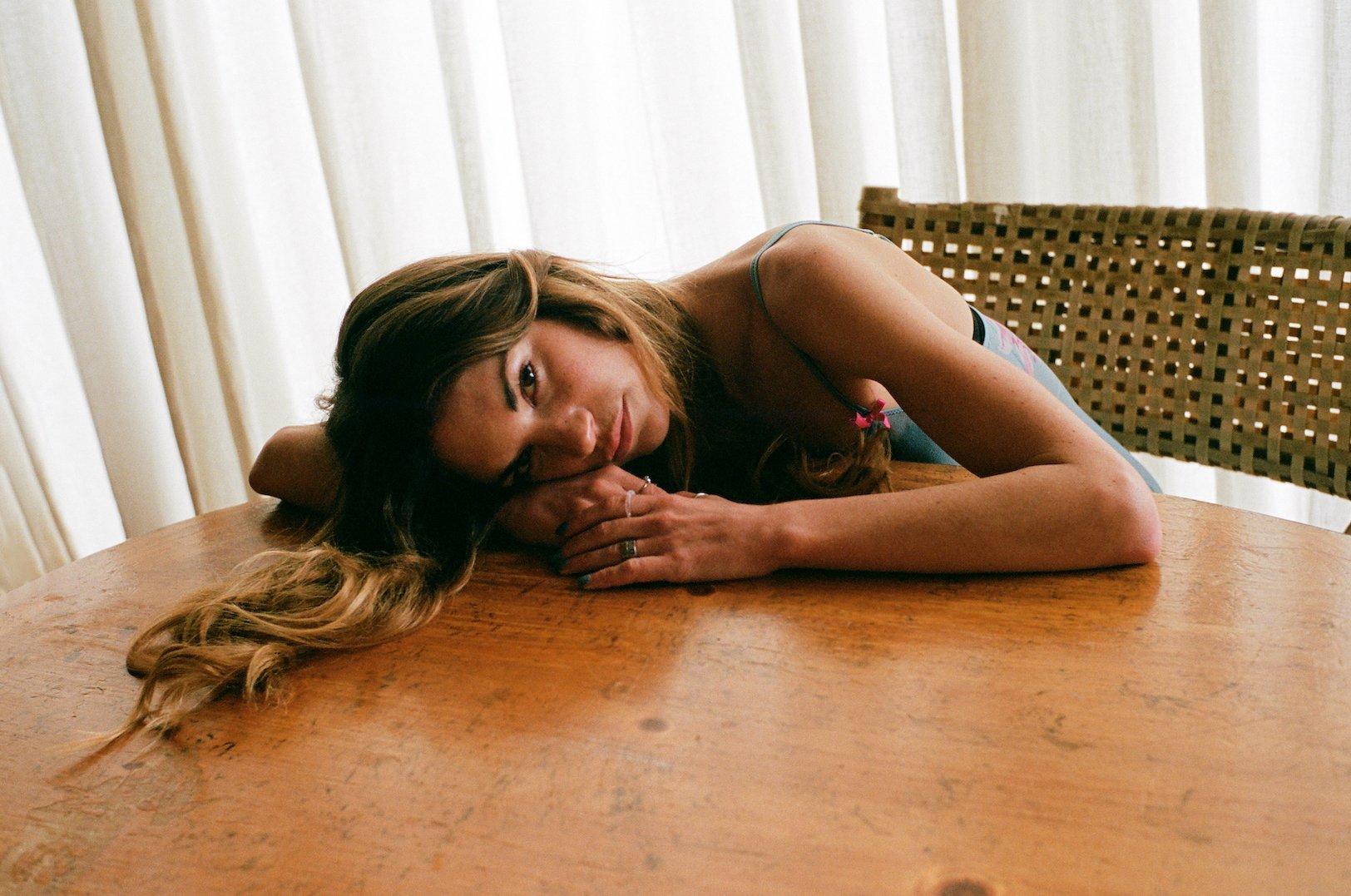
Photo: David O’Donohue
list
Meet Amy Allen, The Hitmaking Singer/Songwriter Behind Sabrina Carpenter's "Please Please Please" & More Pop Gems
Amy Allen has penned hits for stars like Halsey, Harry Styles, and Tate McRae, including two recent smashes from Sabrina Carpenter. As she embarks on her own artist journey, learn more about the GRAMMY-winner's already dazzling career.
Some artists are lucky enough to have a moment: a song of the summer, a radio hit, or a point at which their song dominates the pop conversation. Before even launching her own singing career, Amy Allen has done just that — multiple times.
In 2022, the Maine native contributed to hit songs from Harry Styles, Lizzo, Charli XCX, and King Princess; at the 2023 GRAMMYs, she was one of the inaugural nominees for Songwriter Of The Year, Non-Classical, and celebrated an Album Of The Year win alongside Styles thanks to her work on Harry's House. And as of press time, two songs she co-wrote with Sabrina Carpenter are in the top 10 of the Billboard Hot 100 chart: "Espresso" and "Please Please Please," the latter of which hit No. 1.
When you have a resume and catalog as impressive as Allen's, it's hard not to get stuck in a run of highlights — but Allen's writing style is so full of remarkable emotional depth and inevitable hooks that her life and career deserves further exploration. After binging on classic rock and performing in rock and bluegrass bands in her youth, Allen began writing songs for others in the mid 2010s and has only continued to expand her impact on audiences and collaborators alike.
"Amy is a once-in-a-lifetime writer and friend — it all comes to her very naturally and effortlessly," Carpenter recently told Variety. "She's super versatile: She can wear any hat and yet it still feels authentic. I've learned a lot from her and admire what an incredible collaborator she is."
Along the way, Allen has continued honing her skills as an artist in her own right, releasing a handful of EPs and singles since 2015, initially under the name Amy and the Engine. But on Sept. 6, she's ready to fully introduce herself with her debut album — fittingly titled Amy Allen.
Just after Allen celebrated her latest No. 1 and released her newest single, "even forever," GRAMMY.com rounded up the key details you need to know about the singer/songwriter's diverse musical background, from her advocacy for female creators to seeing Harry Styles sing a song she co-wrote to a massive audience.
Her Origin Story Features A Lot Of Car Talk
Allen's early musical growth relied on four-wheeled vehicles to drive the plot forward — in many different forms. Growing up in rural Maine meant long car rides to for school and family outings, which in turn meant a lot of time with the radio.
"My dad is the biggest classic rock fan, so since I was little, I spent hours every day listening to music in the car with him and my sisters," she told Variety earlier this year.
When it came time for one of her sisters to start a band, the elder Allen named it No U-Turn, setting the theme. When the band needed a new bassist, Amy took up the low end at just 8 years old, learning classic songs from the likes of Tom Petty and Rolling Stones. The band started collecting opening spots at a bar in Portland, Maine, and lasted until Allen was in high school and her sisters had left for college. In addition, she started playing in a bluegrass band called Jerks of Grass alongside her high school guitar teacher.
Eventually, Allen thought about moving on and changing course. "I went to nursing school at Boston College for two years, and within a month of getting there I was like, 'I made a big mistake,'" she continued. After moving over to the prestigious Berklee School of Music, Allen started a new project, yet again turning to vehicular terminology: Amy and the Engine, who would go on to open for the likes of Vance Joy and Kacey Musgraves. The project's timeless indie pop charm shone brightly on singles like "Last Forever" and the 2017 EP Get Me Outta Here!, fusing references ranging from the Cranberries to the Cure.
She's A Major Champion For Women In Music
Back in 2021, Allen pondered whether it was time to carve up one of America's most prominent monuments. "Can you imagine tits on Mount Rushmore/ And Ruth Bader Ginsburg from dynamite sticks?" she sang on "A Woman's World," a highlight from her 2021 solo EP AWW!. The song backs off from that explicit ask, but the low-slung waltz of ghostly piano and gentle acoustic guitar still subversively slices at traditional gender roles and power dynamics.
And while the track may focus its first verse on the Notorious RBG, Allen designed it as a more approachable anthem. "I felt very proud of that song. And it's something that I love to play live, because I think that it's nice as a woman to give that moment to other women in the audience where I see them," she told The Line of Best Fit upon the EP's release.
Her solo work sits in a long line of female pop and rock stars looking to lift others up — with Allen's list of influences including everyone from the Carpenters and Pat Benatar to No Doubt, Hole, and Siouxsie and the Banshees. But she's also aware of the shortcomings in the industry when it comes to behind-the-scenes matters, with female songwriters representing a disproportionately small percentage of the industry and often at lower revenue than their male counterparts.
"It's important to have more women writing and performing so that younger girls can be hearing that and really connecting with that and resonating with that, and then being inspired to do that themselves," she continued. "I'm really excited to hear what the next generation of singer songwriters creates, and I want to do my part in making sure that they're able to."
She Went Full Circle With Selena Gomez
Allen's emotionally salient and indelibly quirky songwriting with the Engine caught the attention of more than just adoring fans. While on a tour stop in New York, she connected with Scott Harris, a songwriter who has worked with the likes of Shawn Mendes, Camila Cabello, Niall Horan, and Meghan Trainor; when Allen eventually moved to New York, she would take on some of Harris' writing sessions when he was in Los Angeles. One of those sessions spawned the first song she'd place with another artist: Selena Gomez's "Back To You," which ended up on the soundtrack for the second season of Netflix's teen drama "13 Reasons Why" in 2018.
"I grew up listening to Selena Gomez, and I know that she's going to be a pop icon forever," Allen told People in 2020. "She's awesome. I was so psyched…It definitely propelled my career in the pop writing field further."
Two years later, she would re-team with Gomez for "My Mind & Me," a single released alongside a documentary film of the same title following the impact of the star's diagnoses with lupus and bipolar disorder on her career. The single similarly offers an openhearted, empathetic look at big mental health struggles, this time in the form of a sweeping, cathartic power ballad driven by stumbling syllables and stair-step piano.
The track was shortlisted for Best Original Song at the 2023 Academy Awards, charted in more than a dozen countries, and, perhaps most importantly, seemed to have made quite the connection with Gomez. "Honestly, it was therapeutic for me," the pop star and actress told Variety in 2022. "I felt super connected to what I was singing and what I was saying."
She Loves Seeing Her Collaborators Live
Songwriters often wind up hidden behind the scenes, unable to really gather the impact that their artistic expression is making on others. But thankfully, Allen has been able to catch a peek in on the arena-sized reactions for some of her biggest collaborators.
One of Allen's most-played co-writes is "Adore You," a highlight from Harry Styles' 2019 album, Fine Line, which has nearly 1.7 billion streams on Spotify alone as of press time. The buoyant, slippery burst of Fleetwood Mac-indebted funk pop embodies the start of an infatuation, and fans similarly felt under the song's spell. And Allen finally got to see that feeling come to life at Styles' album release show at the Kia Forum in Los Angeles in 2019.
"Watching Harry, I was really nervous because the album had only been out for a couple days and I wasn't sure if anybody would know that song," Allen told Variety in 2020. She also noted that the song was a hard turn from more heartbroken tracks she'd written for the likes of Halsey. "'Adore You' was my first feel-good song, so I'm psyched about that," she added.
Though not in person, Allen got a similar bolt of joy when she was able to watch Lizzo perform Styles' track for BBC Radio 1 in 2020. "I idolize Lizzo," Allen continued. "It really just goes to show that the right song can be performed by many different people."
Little did Allen know that she'd get to celebrate a GRAMMY nomination and win alongside Lizzo and Styles, respectively, just three years later. She co-wrote "If You Love Me" from the flute-jamming pop star's 2022 record Special, which was nominated for Album Of The Year at the 2023 GRAMMYs, where Styles' Harry's House (which featured Allen's co-write "Matilda") won the coveted honor.
She Shapeshifts Her Songwriting For Each Artist
When a songwriter has to split their tracks up between multiple different artists, it might be difficult to ensure that each track sounds appropriately fitted to each performer. For Allen, it all comes down to knowing when to follow the rules and when to break them.
"Sometimes we'll be writing and someone will say, 'It should go straight to the chorus here,' and in my brain I'm like, 'But we need a pre-chorus!' — you know, following the ABCs of songwriting," she told Variety. "But I've really been trying over the last couple of years to deconstruct some of those — that you don't need to pull out all the tricks all the time. It can actually make the song more interesting."
In fact, it might come down to what she prioritizes when sitting down to write, rather than which rules to follow. While walking the red carpet for the 2021 Ivor Novello Awards for songwriting and composition, Allen explained her perspective on songwriting formulas to PRS For Music: "When I'm writing for myself, I usually start with the verse and move my way through, and lots of other times when I'm writing with another artist I make sure the chorus is bulletproof."
The GRAMMYs Are Helping Change Her Family's Perspective On Her Career
Allen earned her first GRAMMY nomination in 2022 for her work on Justin Bieber's Justice, but her most meaningful nomination came a year later for Songwriter Of The Year, Non-Classical at the 65th Annual Awards ceremony (alongside Nija Charles, The-Dream, Laura Veltz, and Tobias Jesso, Jr.). While Allen had a hard time contextualizing the recognition, it helped her loved ones better understand the impact of her career.
"I'm just so grateful…Even my closest family and friends, they're like, 'I've listened to this artist for so long, or I listened to this song on the radio, and I had no idea there was a team that helped make this happen,'" she told VERSED: The ASCAP Podcast in 2022. "People like me growing up in small towns, we don't know that being a songwriter for a career is an option… I watched the GRAMMYs when I was growing up, and if I had known that people were making great careers, I would've gotten on the track a lot earlier."
Though the inaugural award ultimately went to Jesso, Jr., Allen seems to agree that he's deserving of the honor — he's one of her collaborators on her upcoming album.
Maine Will Always Be Home — and An Inspiration
For those who haven't been to Maine, a quick look at Allen's social media will reveal just how stunning the American Northeast can be. Among TikToks promoting her music, Allen almost inevitably drops in a clip displaying the expansive natural beauty of her home state — whether she's on a rope swing over a dazzlingly blue pool of water, or dropping a front spin while skating on the ice, or watching the massive waves from her family home.
"POV: ur back home in maine and wondering why u ever left," she plastered over one particularly stunning TikTok montage of a dazzling day swimming amongst waterfalls. The only thing as beautiful as the scenery is the music behind it is an unreleased track about missing home — proof that Maine will always be part of her, and that she clearly made the correct choice in following her songwriting dreams.
Latest News & Exclusive Videos
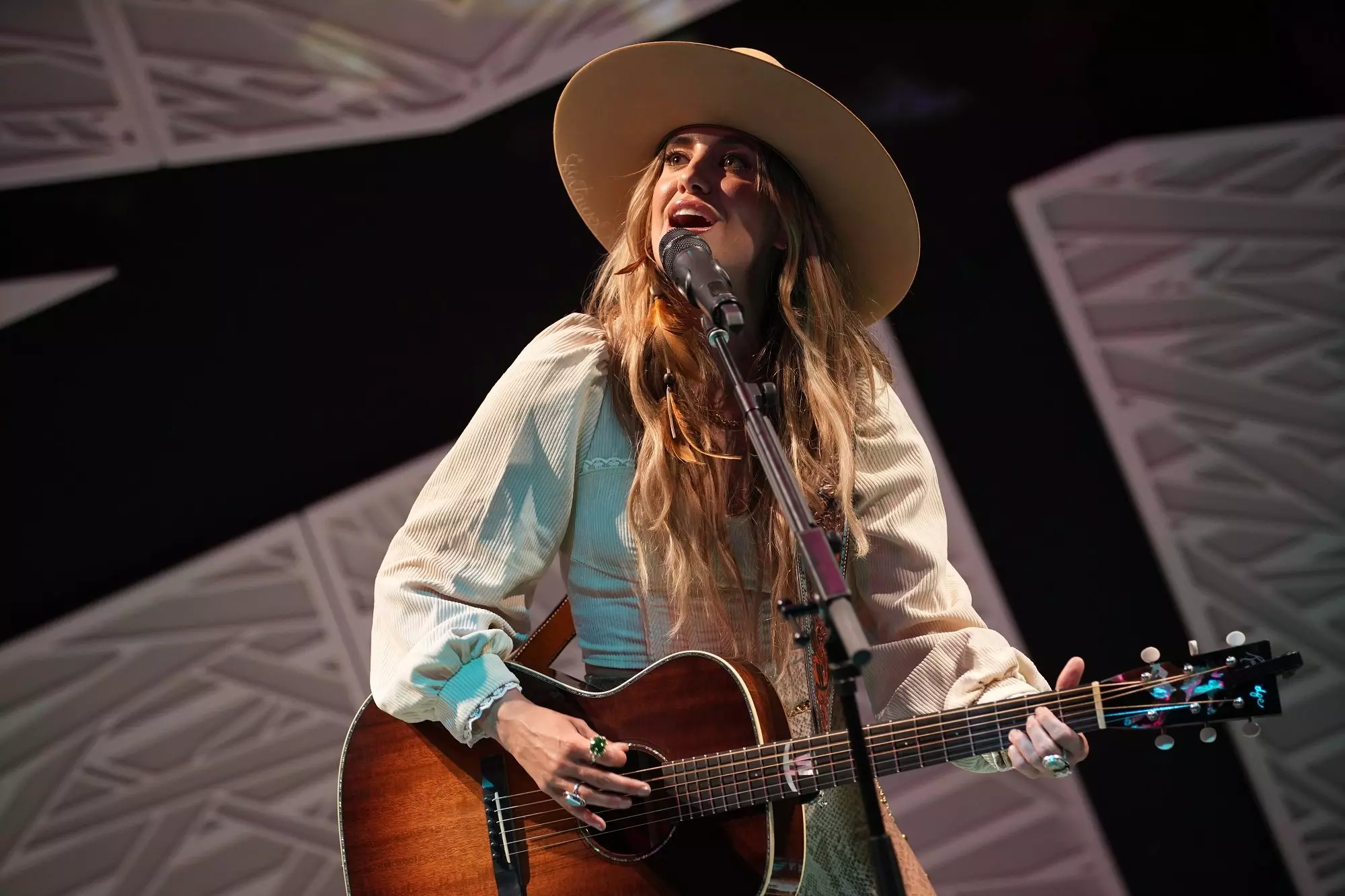
20 Live Events At The GRAMMY Museum This September: Experience Orville Peck, Kate Hudson, Tierra Whack & More

Watch Wunderhorse Perform "July"
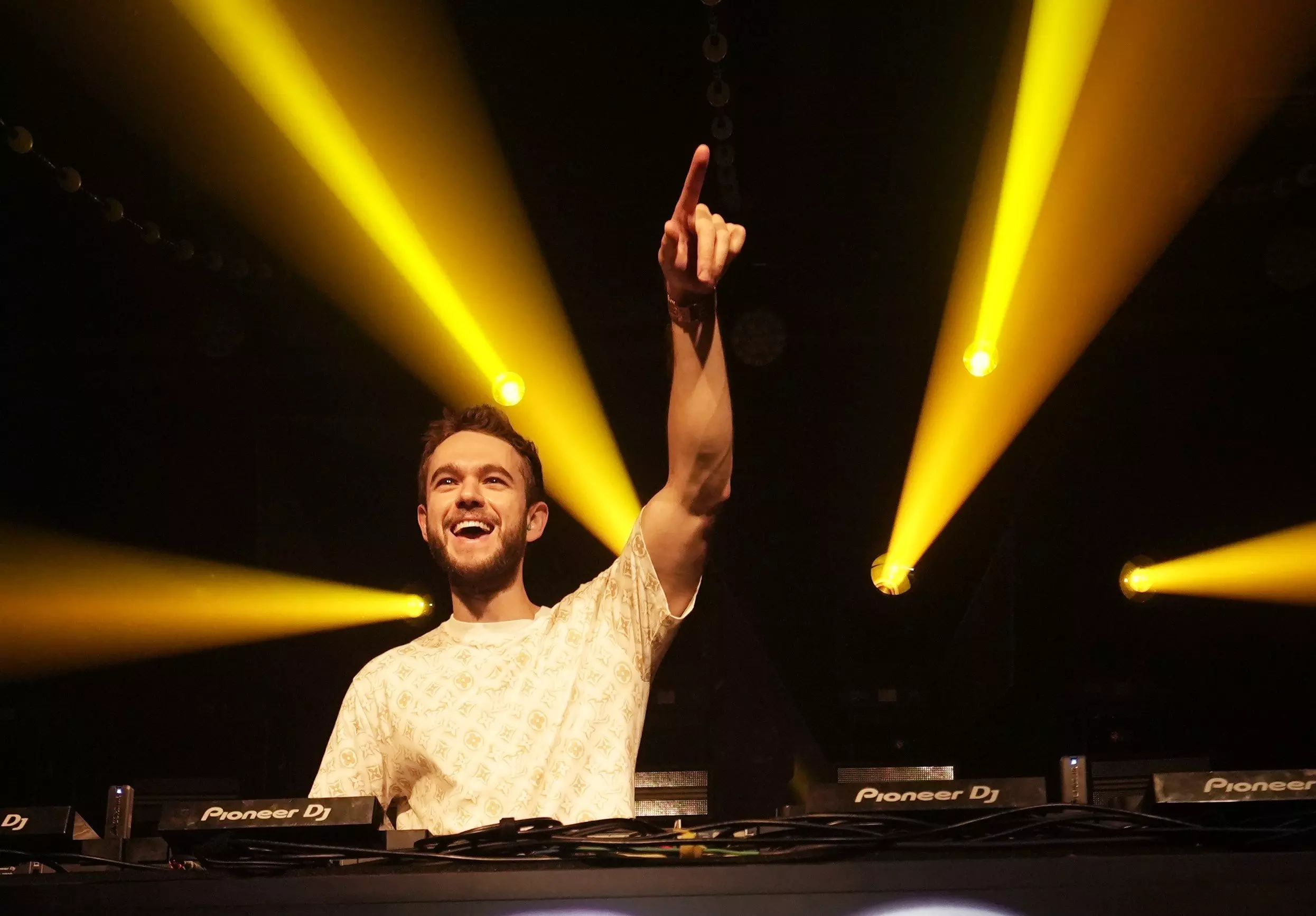
Zedd's Road To 'Telos': How Creating For Himself & Disregarding Commercial Appeal Led To An Evolutionary New Album
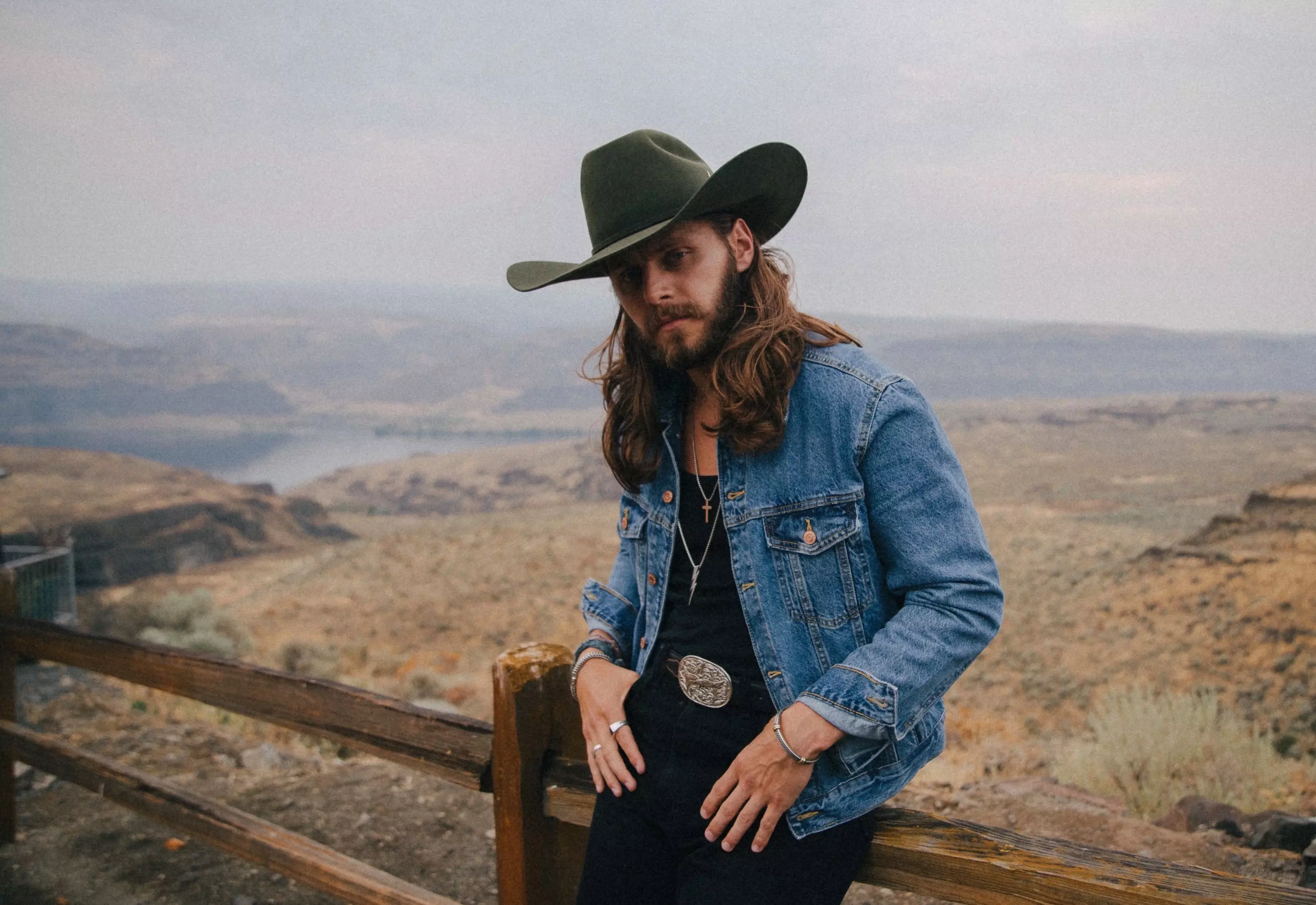
Warren Zeiders' Big Year: The Country Star Recounts His Journey From 'Pretty Little Poison' To 'Relapse'

Watch MonoNeon Share His Bass

Photo: Jeremy Cowart
interview
Behind Ryan Tedder's Hits: Stories From The Studio With OneRepublic, Beyoncé, Taylor Swift & More
As OneRepublic releases their latest album, the group's frontman and pop maverick gives an inside look into some of the biggest songs he's written — from how Beyoncé operates to Tom Cruise's prediction for their 'Top Gun' smash.
Three months after OneRepublic began promoting their sixth album, Artificial Paradise, in February 2022, the band unexpectedly had their biggest release in nearly a decade. The pop-rock band's carefree jam, "I Ain't Worried," soundtracked Top Gun: Maverick's most memeable scene and quickly became a global smash — ultimately delaying album plans in favor of promoting their latest hit.
Two years later, "I Ain't Worried" is one of 16 tracks on Artificial Paradise, which arrived July 12. It's a seamless blend of songs that will resonate with longtime and newer fans alike. From the layered production of "Hurt," to the feel-good vibes of "Serotonin," to the evocative lyrics of "Last Holiday," Artificial Paradise shows that OneRepublic's sound is as dialed-in as it is ever-evolving.
The album also marks the end of an era for OneRepublic, as it's the last in their contract with Interscope Records. But for the group's singer, Ryan Tedder, that means the future is even more exciting than it's been in their entire 15-year career.
"I've never been more motivated to write the best material of my life than this very moment," he asserts. "I'm taking it as a challenge. We've had a lot of fun, and a lot of uplifting records for the last seven or eight years, but I also want to tap back into some deeper material with the band."
As he's been prepping Artificial Paradise with his OneRepublic cohorts, Tedder has also been as busy as he's ever been working with other artists. His career as a songwriter/producer took off almost simultaneously with OneRepublic's 2007 breakthrough, "Apologize" (his first major behind-the-board hit was Leona Lewis' "Bleeding Love"); to this day he's one of the go-to guys for pop's biggest names, from BLACKPINK to Tate McRae.
Tedder sat down with GRAMMY.com to share some of his most prominent memories of OneRepublic's biggest songs, as well as some of the hits he's written with Beyoncé, Adele, Taylor Swift and more.
OneRepublic — "Apologize," 'Dreaming Out Loud' (2007)
I was producing and writing other songs for different artists on Epic and Atlantic — I was just cutting my teeth as a songwriter in L.A. This is like 2004. I was at my lowest mentally and financially. I was completely broke. Creditors chasing me, literally dodging the taxman and getting my car repoed, everything.
I had that song in my back pocket for four years. A buddy of mine just reminded me last month, a songwriter from Nashville — Ashley Gorley, actually. We had a session last month, me, him and Amy Allen, and he brought it up. He was like, "Is it true, the story about 'Apologize'? You were completely broke living in L.A. and Epic Records offered you like 100 grand or something just for the right to record the song on one of their artists?"
And that is true. It was, like, 20 [grand], then 50, then 100. And I was salivating. I was, like, I need this money so bad. And I give so many songs to other people, but with that song, I drew a line in the sand and said, "No one will sing this song but me. I will die with this song."
It was my story, and I just didn't want anyone else to sing it. It was really that simple. It was a song about my past relationships, it was deeply personal. And it was also the song that — I spent two years trying to figure out what my sound was gonna be. I was a solo artist… and I wasn't landing on anything compelling. Then I landed on "Apologize" and a couple of other songs, and I was like, These songs make me think of a band, not solo artist material. So it was the song that led me to the sound of OneRepublic, and it also led me to the idea that I should start a band and not be a solo artist.
We do it every night. I'll never not do it. I've never gotten sick of it once. Every night that we do it, whether I'm in Houston or Hong Kong, I look out at the crowd and look at the band, and I'm like, Wow. This is the song that got us here.
Beyoncé — "Halo," 'I Am…Sacha Fierce' (2008)
We were halfway through promoting Dreaming Out Loud, our first album. I played basketball every day on tour, and I snapped my Achilles. The tour got canceled. The doctor told me not to even write. And I had this one sliver of an afternoon where my wife had to run an errand. And because I'm sadistic and crazy, I texted [songwriter] Evan Bogart, "I got a three-hour window, race over here. Beyoncé called me and asked me to write her a song. I want to do it with you." He had just come off his huge Rihanna No. 1, and we had an Ashley Tisdale single together.
When you write enough songs, not every day do the clouds part and God looks down on you and goes, "Here." But that's what happened on that day. I turn on the keyboard, the first sound that I play is the opening sound of the song. Sounds like angels singing. And we wrote the song pretty quick, as I recall.
I didn't get a response [from Beyoncé after sending "Halo" over], which I've now learned is very, very typical of her. I did Miley Cyrus and Beyoncé "II MOST WANTED" [from COWBOY CARTER] — I didn't know that was coming out 'til five days before it came out. And when I did "XO" [from 2013's Beyoncé], I found out that "XO" was coming out 12 hours before it came out. That's how she operates.
OneRepublic — "Good Life," 'Waking Up' (2009)
["Good Life"] was kind of a Hail Mary. We already knew that "All the Right Moves" would be the first single [from Waking Up]. We knew that "Secrets" was the second single. And in the 11th hour, our engineer at the time — who I ended up signing as a songwriter, Noel Zancanella — had this drum loop that he had made, and he played it for Brent [Kutzle] in our band. Brent said, "You gotta hear this drum loop that Noel made. It's incredible."
He played it for me the next morning, and I was like, "Yo throw some chords to this. I'm writing to this today." They threw some chords down, and the first thing out of my mouth was, [sings] "Oh, this has gotta be the good life."
It's the perfect example of, oftentimes, the chord I've tried to strike with this band with some of our bigger records, [which] is happy sad. Where you feel nostalgic and kind of melancholic, but at the same time, euphoric. That's what those chords and that melody did for me.
I was like, "Hey guys, would it be weird if I made the hook a whistle?" And everyone was like, "No! Do not whistle!" They're like, "Name the last hit song that had a whistle." And the only one I could think of was, like, Scorpion from like, 1988. [Laughs.] So I thought, To hell with it, man, it's been long enough, who cares? Let's try it. And the whistle kind of made the record. It became such a signature thing.
Adele — "Rumour Has It," '21' (2011)
"Rumour Has It" was the first song I did in probably a four year period, with any artist, that wasn't a ballad. All any artist ever wanted me to write with them or for them, was ballads, because of "Halo," and "Apologize" and "Bleeding Love."
I begged [Adele] to do a [song with] tempo, because we did "Turning Tables," another ballad. She was in a feisty mood [that day], so I was like, "Okay, we're doing a tempo today!"
Rick Rubin was originally producing the whole album. I was determined to produce Adele, not just write — because I wanted a shot to show her that I could, and to show myself. I stayed later after she left, and I remember thinking, What can I do in this record in this song that could be so difficult to reproduce that it might land me the gig?
So I intentionally muted the click track, changed the tempo, and [created that] whole piano bridge. I was making it up as I went. When she got in that morning. I said, "I have a crazy idea for a bridge. It's a movie." She listens and she says, "This is really different, I like this! How do we write to this?"
I mean, it was very difficult. [But] we finished the song. She recorded the entire song that day. She recorded the whole song in one take. I've never seen anyone do that in my life — before or since.
Then I didn't hear from her for six months. Because I handed over the files, and Rick Rubin's doing it, so I don't need to check on it. I randomly check on the status of the song — and at this point, if you're a songwriter or producer, you're assuming that they're not keeping the songs. Her manager emails my manager, "Hey, good news — she's keeping both songs they did, and she wants Ryan to finish 'Rumour Has It' production and mix it."
When I finally asked her, months later — probably at the GRAMMYs — I said, "Why didn't [Rick] do it?" She said, "Oh he did. It's that damn bridge! Nobody could figure out what the hell you were doing…It was so problematic that we just gave up on it."
OneRepublic — "Counting Stars," 'Native' (2013)
I was in a Beyoncé camp in the Hamptons writing for the self-titled album. [There were] a bunch of people in the house — me, Greg Kurstin, Sia — it was a fun group of people. I had four days there, and every morning I'd get up an hour and a half before I had to leave, make a coffee, and start prepping for the day. On the third day, I got up, I'm in the basement of this house at like 7 in the morning, and I'm coming up with ideas. I stumble across that chord progression, the guitar and the melody. It was instant shivers up my spine.
"Lately I've been losing sleep, dreaming about the things that we could be" is the only line that I had. [My] first thought was, I should play this for Beyoncé, and then I'm listening to it and going, This is not Beyoncé, not even remotely. It'd be a waste. So I tabled it, and I texted the guys in my band, "Hey, I think I have a potentially really big record. I'm going to finish it when I get back to Denver."
I got back the next week, started recording it, did four or five versions of the chorus, bouncing all the versions off my wife, and then eventually landed it. And when I played it for the band, they were like, "This is our favorite song."
Taylor Swift — "Welcome to New York," '1989' (2014)
It was my second session with Taylor. The first one was [1989's] "I Know Places," and she sent me a voice memo. I was looking for a house in Venice [California], because we were spending so much time in L.A. So that whole memory is attached to me migrating back to Los Angeles.
But I knew what she was talking about, because I lived in New York, and I remember the feeling — endless possibilities, all the different people and races and sexes and loves. That was her New York chapter. She was so excited to be there. If you never lived there, and especially if you get there and you've got a little money in the pocket, it is so exhilarating.
It was me just kind of witnessing her brilliant, fast-paced, lyrical wizardry. [Co-producer] Max [Martin] and I had a conversation nine months later at the GRAMMYs, when we had literally just won for 1989. He kind of laughed, he pointed to all the other producers on the album, and he's like, "If she had, like, three more hours in the day, she would just figure out what we do and she would do it. And she wouldn't need any of us."
And I still think that's true. Some people are just forces of nature in and among themselves, and she's one of them. She just blew me away. She's the most talented top liner I've ever been in a room with, bar none. If you're talking lyric and melody, I've never been in a room with anyone faster, more adept, knows more what they want to say, focused, efficient, and just talented.
Jonas Brothers — "Sucker," 'Happiness Begins' (2019)
I had gone through a pretty dry spell mentally, emotionally. I had just burned it at both ends and tapped out, call it end of 2016. So, really, all of 2017 for me was a blur and a wash. I did a bunch of sessions in the first three months of the year, and then I just couldn't get a song out. I kept having, song after song, artists telling me it's the first single, [then] the song was not even on the album. I had never experienced that in my career.
I went six to nine months without finishing a song, which for me is unheard of. Andrew Watt kind of roped me back into working with him. We did "Easier" for 5 Seconds of Summer, and we did some Sam Smith and some Miley Cyrus, and right in that same window, I did this song "Sucker." Two [or] three months later, Wendy Goldstein from Republic [Records] heard the record, I had sent it to her. She'd said, very quietly, "We're relaunching the Jonas Brothers. They want you to be involved in a major way. Do you have anything?"
She calls me, she goes, "Ryan, do not play this for anybody else. This is their comeback single. It's a No. 1 record. Watch what we're gonna do." And she delivered.
OneRepublic — "I Ain't Worried," 'Top Gun: Maverick' Soundtrack (2022)
My memory is, being in lockdown in COVID, and just being like, Who knows when this is going to end, working out of my Airstream at my house. I had done a lot of songs for movies over the years, and [for] that particular [song] Randy Spendlove, who runs [music at] Paramount, called me.
I end up Zooming with Tom Cruise [and Top Gun: Maverick director] Jerry Bruckheimer — everybody's in lockdown during post-production. The overarching memory was, Holy cow, I'm doing the scene, I'm doing the song for Top Gun. I can't believe this is happening. But the only way I knew how to approach it, rather than to, like, overreact and s— the bed, was, It's just another day.
I do prescription songs for movies, TV, film all the time. I love a brief. It's so antithetical to most writers. I'm either uncontrollably lazy or the most productive person you've ever met. And the dividing line between the two is, if I'm chasing some directive, some motivation, some endpoint, then I can be wildly productive.
I just thought, I'm going to do the absolute best thing I can do for this scene and serve the film. OneRepublic being the performing artist was not on the menu in my mind. I just told them, "I think you need a cool indie band sounding, like, breakbeat." I used adjectives to describe what I heard when I saw the scene, and Tom got really ramped and excited.
You could argue [it's the biggest song] since the band started. The thing about it is, it's kind of become one of those every summer [hits]. And when it blew up, that's what Tom said. He said, "Mark my words, dude. You're gonna have a hit with this every summer for, like, the next 20 years or more."
And that's what happened. The moment Memorial Day happened, "I Ain't Worried" got defrosted and marched itself back into the top 100.
Tate McRae — "Greedy," 'THINK LATER' (2023)
We had "10:35" [with Tiësto] the previous year that had been, like, a No. 1 in the UK and across Europe and Australia. So we were coming off the back of that, and the one thing she was clear about was, "That is not the direction of what I want to do."
If my memory serves me correct, "greedy" was the next to last session we had. Everything we had done up to that point was kind of dark, midtempo, emotional. So "greedy" was the weirdo outlier. I kept pushing her to do a dance record. I was like, "Tate, there's a lot of people that have great voices, and there's a lot of people who can write, but none of those people are professional dancers like you are. Your secret weapon is the thing you're not using. In this game and this career, you've got to use every asset that you have and exploit it."
There was a lot of cajoling. On that day, we did it, and I thought it was badass, and loved it. And she was like, "Ugh, what do we just do? What is this?"
So then it was just, like, months, months and months of me constantly bringing that song back up, and playing it for her, and annoying the s— out of her. And she came around on it.
She has very specific taste. So much of the music with Tate, it really is her steering. I'll do what I think is like a finished version of a song, and then she will push everyone for weeks, if not months, to extract every ounce of everything out of them, to push the song harder, further, edgier — 19 versions of a song, until finally she goes, "Okay, this is the one." She's a perfectionist.
OneRepublic — "Last Holiday," 'Artificial Paradise' (2024)
I love [our latest single] "Hurt," but my favorite song on the album is called "Last Holiday." I probably started the beginning of that lyric, I'm not joking, seven, eight years ago. But I didn't finish it 'til this past year.
The verses are little maxims and words of advice that I've been given throughout the years. It's almost cynical in a way, the song. When I wrote the chorus, I was definitely in kind of a down place. So the opening line is, "So I don't believe in the stars anymore/ They never gave me what I wished for." And it's, obviously, a very not-so-slight reference to "Counting Stars." But it's also hopeful — "We've got some problems, okay, but this isn't our last holiday."
It's very simple sentiments. Press pause. Take some moments. Find God before it all ends. All these things with this big, soaring chorus. Musically and emotionally and sonically, that song — and "Hurt," for sure — but "Last Holiday" is extremely us-sounding.
The biggest enemy that we've had over the course of 18 years, I'll be the first to volunteer, is, this ever-evolving, undulating sound. No one's gonna accuse me of making these super complex concept albums, because that's just not how my brain's wired. I grew up listening to the radio. I didn't grow up hanging out in the Bowery in CBGBs listening to Nick Cave. So for us, the downside to that, and for me doing all these songs for all these other people, is the constant push and pull of "What is their sound? What genre is it?"
I couldn't put a pin in exactly what the sound is, but what I would say is, if you look at the last 18 years, a song like "Last Holiday" really encompasses, sonically, what this band is about. It's very moving, and emotional, and dynamic. It takes me to a place — that's the best way for me to put it. And hopefully the listener finds the same.
Latest News & Exclusive Videos

20 Live Events At The GRAMMY Museum This September: Experience Orville Peck, Kate Hudson, Tierra Whack & More

Watch Wunderhorse Perform "July"

Zedd's Road To 'Telos': How Creating For Himself & Disregarding Commercial Appeal Led To An Evolutionary New Album

Warren Zeiders' Big Year: The Country Star Recounts His Journey From 'Pretty Little Poison' To 'Relapse'

Watch MonoNeon Share His Bass
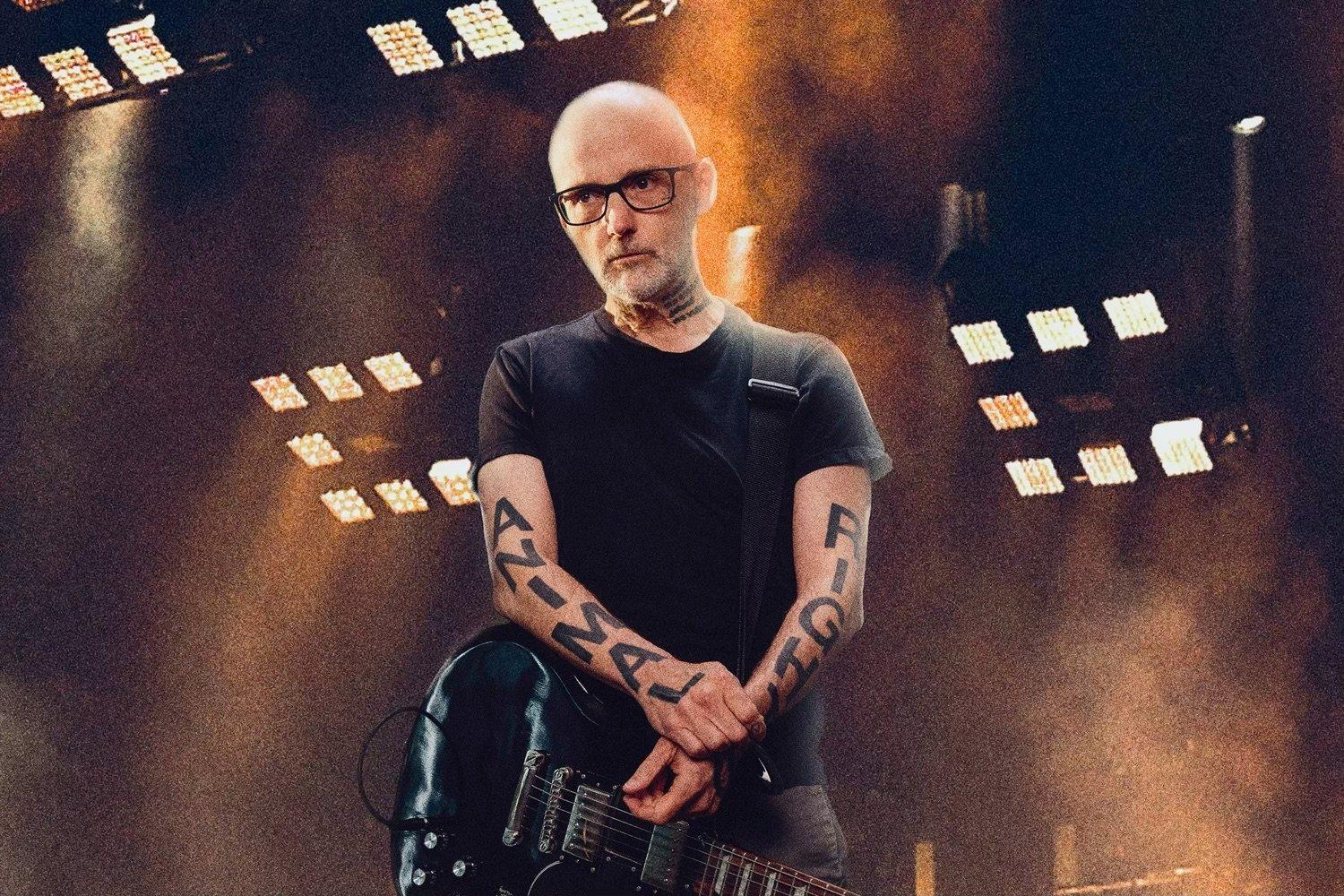
Photo: Mike Formanski
interview
"Let Yourself Be Idiosyncratic": Moby Talks New Album 'Always Centered At Night' & 25 Years Of 'Play'
"We're not writing for a pop audience, we don't need to dumb it down," Moby says of creating his new record. In an interview, the multiple-GRAMMY nominee reflects on his latest album and how it contrasts with his legendary release from 1999.
Moby’s past and present are converging in a serendipitous way. The multiple-GRAMMY nominee is celebrating the 25th anniversary of his seminal work, Play, the best-selling electronic dance music album of all time, and the release of his latest album, always centered at night.
Where Play was a solitary creation experience for Moby, always centered at night is wholly collaborative. Recognizable names on the album are Lady Blackbird on the blues-drenched "dark days" and serpentwithfeet on the emotive "on air." But always centered at night’s features are mainly lesser-known artists, such as the late Benjamin Zephaniah on the liquid jungle sounds of "where is your pride?" and Choklate on the slow grooves of "sweet moon."
Moby’s music proves to have staying power: His early ‘90s dance hits "Go" and "Next is the E" still rip up dancefloors; the songs on Play are met with instant emotional reactions from millennials who heard them growing up. Moby is even experiencing a resurgence of sorts with Gen Z. In 2023, Australian drum ‘n’ bass DJ/producer Luude and UK vocalist Issey Cross reimagined Moby’s classic "Porcelain" into "Oh My." Earlier this year, Moby released "You and Me" with Italian DJ/producer Anfisa Letyago.
Music is just one of Moby’s many creative ventures. He wrote and directed Punk Rock Vegan Movie as well as writing and starring in his homemade documentary, Moby Doc. The two films are produced by his production company, Little Walnut, which also makes music videos, shorts and the podcast "Moby Pod." Moby and co-host Lindsay Hicks have an eclectic array of guests, from actor Joe Manganiello to Ed Begley, Jr., Steve-O and Hunter Biden. The podcast interviews have led to "some of the most meaningful interpersonal experiences," Moby tells GRAMMY.com.
A upcoming episode of "Moby Pod" dedicated to Play was taped live over two evenings at Los Angeles’ Masonic Lodge at Hollywood Forever Cemetery. The episode focuses on Moby recounting his singular experiences around the unexpected success of that album — particularly considering the abject failure of his previous album, Animal Rights. The narrative was broken up by acoustic performances of songs from Play, as well as material from Always Centered at Night (which arrives June 14) with special guest Lady Blackbird. Prior to the taping, Moby spoke to GRAMMY.com about both albums.
'Always centered at night' started as a label imprint then became the title of your latest album. How did that happen?
I realized pretty quickly that I just wanted to make music and not necessarily worry about being a label boss. Why make more busy work for myself?
The first few songs were this pandemic process of going to SoundCloud, Spotify, YouTube and asking people for recommendations to find voices that I wasn’t familiar with, and then figuring out how to get in touch with them. The vast majority of the time, they would take the music I sent them and write something phenomenal.
That's the most interesting part of working with singers you've never met: You don't know what you're going to get. My only guidance was: Let yourself be creative, let yourself be idiosyncratic, let the lyrics be poetic. We're not writing for a pop audience, we don't need to dumb it down. Although, apparently Lady Blackbird is one of Taylor Swift's favorite singers.
Guiding the collaborators away from pop music is an unusual directive, although perhaps not for you?
What is both sad and interesting is pop has come to dominate the musical landscape to such an extent that it seems a lot of musicians don't know they're allowed to do anything else. Some younger people have grown up with nothing but pop music. Danaé Wellington, who sings "Wild Flame," her first pass of lyrics were pop. I went back to her and said, "Please be yourself, be poetic." And she said, "Well, that’s interesting because I’m the poet laureate of Manchester." So getting her to disregard pop lyrics and write something much more personal and idiosyncratic was actually easy and really special.
You certainly weren’t going in the pop direction when making 'Play,' but it ended up being an extremely popular album. Did you have a feeling it was going to blow up the way it did?
I have a funny story. I had a date in January 1999 in New York. We went out drinking and I had just gotten back the mastered version of Play. We're back at my apartment, and before our date became "grown up," we listened to the record from start to finish. She actually liked it. And I thought, Huh, that's interesting. I didn't think anyone was going to like this record.
You didn’t feel anything different during the making of 'Play?'
I knew to the core of my being that Play was going to be a complete, abject failure. There was no doubt in my mind whatsoever. It was going to be my last record and it was going to fail. That was the time of people going into studios and spending half a million dollars. It was Backstreet Boys and Limp Bizkit and NSYNC; big major label records that were flawlessly produced. Play was made literally in my bedroom.
I slept under the stairs like Harry Potter in my loft on Mott Street. I had one bedroom and that's where I made the record on the cheapest of cheap equipment held up literally on milk crates. Two of the songs were recorded to cassette, that's how cheap the record was. It was this weird record made by a has-been, a footnote from the early rave days. There was no world where I thought it was going to be even slightly successful. Daniel Miller from Mute said — and I remember this very clearly — "I think this record might sell over 50,000 copies." And I said, "That’s kind of you to say but let's admit that this is going to be a failure. Thank you for releasing my last record."
Was your approach in making 'Play' different from other albums?
The record I had made before Play, Animal Rights, was this weird, noisy metal punk industrial record that almost everybody hated. I remember this moment so vividly: I was playing Glastonbury in 1998 and it was one of those miserable Glastonbury years. When it's good, it's paradise; it's really special. But the first time I played, it was disgusting, truly. A foot and a half of mud everywhere, incessant rain and cold. I was telling my manager that I wanted to make another punk rock metal record. And he said the most gentle thing, "I know you enjoy making punk rock and metal. People really enjoy when you make electronic music."
The way he said it, he wasn't saying, "You would help your career by making electronic music." He simply said, "People enjoy it." If I had been my manager, I would have said, "You're a f—ing idiot. Everyone hated that record. What sort of mental illness and masochism is compelling you to do it again?" Like Freud said, the definition of mental illness is doing the same thing and expecting different results. But his response was very emotional and gentle and sweet, and that got through to me. I had this moment where I realized, I can make music that potentially people will enjoy that will make them happy. Why not pursue that?
That was what made me not spend my time in ‘98 making an album inspired by Sepultura and Pantera and instead make something more melodic and electronic.
After years of swearing off touring, what’s making you hit stages this summer?
I love playing live music. If you asked me to come over and play Neil Young songs in your backyard, I would say yes happily, in a second. But going on tour, the hotels and airports and everything, I really dislike it.
My manager tricked me. He found strategically the only way to get me to go on tour was to give the money to animal rights charities. My philanthropic Achilles heel. The only thing that would get me to go on tour. It's a brief tour of Europe, pretty big venues, which is interesting for an old guy, but when the tour ends, I will have less money than when the tour begins.
Your DJ sets are great fun. Would you consider doing DJ dates locally?
Every now and then I’ll do something. But there’s two problems. As I've become very old and very sober, I go to sleep at 9 p.m. This young guy I was helping who was newly sober, he's a DJ. He was doing a DJ set in L.A. and he said, "You should come down. There's this cool underground scene." I said, "Great! What time are you playing?" And he said "I’m going on at 1 a.m." By that point I've been asleep for almost five hours.
I got invited to a dinner party recently that started at 8 p.m. and I was like, "What are you on? Cocaine in Ibiza? You're having dinner at 8 p.m. What craziness is that? That’s when you're putting on your soft clothes and watching a '30 Rock' rerun before bed. That's not going out time." And the other thing is, unfortunately, like a lot of middle aged or elderly musicians, I have a little bit of tinnitus so I have to be very cautious around loud music.
Are you going to write a third memoir at any point?
Only when I figure out something to write. It's definitely not going to be anecdotes about sobriety because my anecdotes are: woke up at 5 a.m., had a smoothie, read The New York Times, lamented the fact that people are voting for Trump, went for a hike, worked on music, played with Bagel the dog, worked on music some more went to sleep, good night. It would be so repetitive and boring.
It has to be something about lived experience and wisdom. But I don't know if I've necessarily gotten to the point where I have good enough lived experience and wisdom to share with anyone. Maybe if I get to that point, I'll probably be wrong, but nonetheless, that would warrant maybe writing another book.
Machinedrum's New Album '3FOR82' Taps Into The Spirit Of His Younger Years
